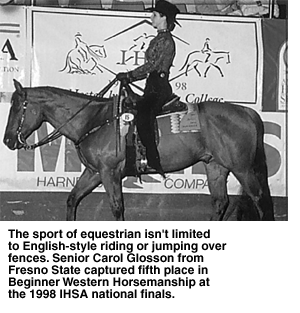The NCAA News - News and Features
The NCAA News -- February 15, 1999
Members have much to learn about equestrian
From Walk-Trot to Open Equitation, the sport is unfamiliar to many
 While many NCAA member institutions offer equestrian and compete in the Intercollegiate Horse Show Association (IHSA), fewer athletics administrators are familiar with the sport than with, say, ice hockey. While many NCAA member institutions offer equestrian and compete in the Intercollegiate Horse Show Association (IHSA), fewer athletics administrators are familiar with the sport than with, say, ice hockey.
"At this point people don't know a lot about equestrian," said Cheryl L. Levick, senior woman administrator at Stanford University and chair of the NCAA Committee on Women's Athletics. "There's a learning curve with it. And, is it a sport where there's broad-based support? Is it one that institutions want to add? It does seem quite popular in some areas."
Some institutions offer equestrian as part of their equine studies programs, in which students may receive an education to prepare them to work in the equine industry.
While that once meant working as a riding instructor or as a horse trainer, students in these programs now may pursue opportunities in the equine business world -- for example as a product representative for a company, as an adjuster in the equine insurance industry or as a public relations professional for one of the equine breed associations.
Other institutions offer equestrian competition as an offshoot of their physical education curriculum, where they offer riding. Still other institutions offer equestrian as part of their animal science program.
While it's difficult now to say how equestrian might work as an NCAA championship sport, the IHSA, the sport's current governing body, has a variety of different events in its current national competition. There is Hunt Seat Equitation (which is English-style riding) and Western Horsemanship.
First, a quick definition: equitation is the art of riding on horseback.
An English saddle is used for Hunt Seat, which also may involve fences for the horses to jump over. A western saddle (or stock seat) is used in Western Horsemanship, and the horses do not jump over fences. Instead, advanced riders complete a complicated reining pattern with the horse.
Within Hunt Seat, there are typically the following classes: Walk-Trot Equitation, Walk-Trot-Canter (often divided into Beginning Walk-Trot-Canter and Advanced Walk-Trot Canter), Novice Equitation on the Flat, Novice Equitation Over Fences, Intermediate Equitation on the Flat, Intermediate Equitation Over Fences, Open Equitation on the Flat and Open Equitation Over Fences. Walk-Trot Equitation is for beginners and Open Equitation is for the most advanced riders.
Within Western Horsemanship, there are typically the following classes: Beginner Western Horsemanship, Intermediate Western Horsemanship (often divided into Intermediate Western Horsemanship I and II), Advanced Western Horsemanship (often divided into Advanced Western Horsemanship I and II), Open Western Horsemanship and Open Reining Pattern. Again, the Open classes are for the most advanced riders.
Competing institutions in the IHSA are required to compete in English (Hunt Seat) riding. They are not required to compete in Western Horsemanship, although many institutions in the Western United States do.
Equestrian events are a part of the summer Olympics, but those events work differently than IHSA events.
One more important point about the way equestrian events on the collegiate level are conducted: Institutions do not need to own their own horses or their own riding facilities to participate.
Those participants who do own their own horses do not typically use them in competition, nor do they typically transport them long distances for competition. Competitors ride the horses whose names they have drawn at the competition site.
"You don't have to own a horse to be a member of a team," said Irene Harris, equestrian sport supervisor and women's tennis coach at California State University, Fresno. "That gives all of women more opportunity. You know, there are so many young girls out there who are dying to have access to a horse. Maybe they live in the city or maybe they can't afford to ride. Equestrian offers them access.
"It's amazing to me the interest that it has, and I think equestrian will continue to generate more interest as we go (through the emerging sport process)."
|